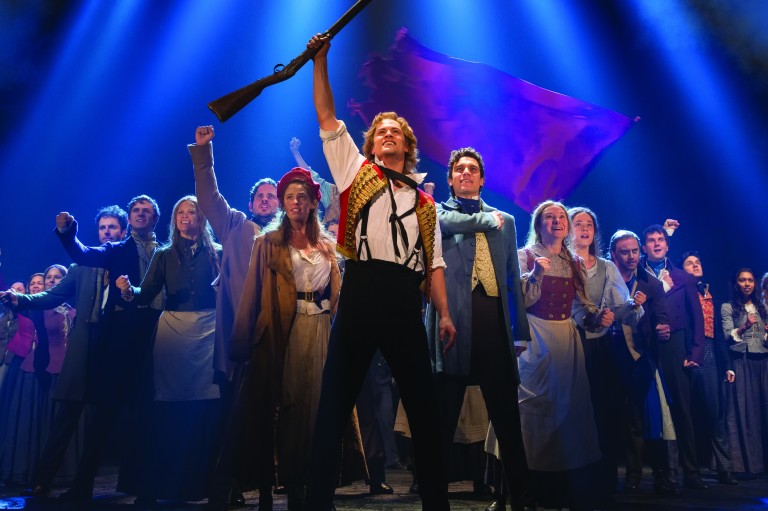Les Incroyables
I have grown up surrounded by song and dance. Since I was little, I’d watch and listen to Annie and The Sound of Music for days on end. I watched my first live musical when I was nine, and that began my great love for them. From the theatrics in Mary Poppins to the energy in The Lion King, every musical I watched had a different type of greatness. Wicked was an experience I anticipated and looked forward to. It was my best friend’s favorite musical and I had, thus, heard so much about it that naturally, I had to see what the hype was about. Two years ago I got to witness Wicked on Broadway and it was absolutely breathtaking with amazing songs and performances that left me awestruck. Then, less than a year ago, I had the opportunity to catch Wicked in Brazil, but I was very skeptical. Would the songs be as good once translated? Would it ruin the magic of the first one I’d seen? I’d assumed it would be like watching movies that are dubbed: You can understand it, but it’s just not as good as the original. “Brazilian” Wicked completely surpassed my expectations. The magic of the original was still there and the translations were magnificent. It was only after Wicked, that I realized that something as special as a musical can transcend language barriers and be just as amazing in an entirely different language. Last week, my belief that musicals transcend languages was once again vindicated. I had the opportunity to watch Les Miserables in São Paulo in Portuguese and compare it to both the American movie and the Broadway experience.
The story takes place during the French Revolution and lasts approximately 50 years. We follow the story of Jean Valjean who is arrested for stealing a loaf of bread and sentenced to 20 years in prison. He escapes and is able to start a new life with the help of a Bishop. Ten years pass and he owns a factory and is mayor of a small town. In the factory, we meet Fantine who is fired after the head of the factory discovers she has a child who she is supporting. Fantine is forced to sell her hair and turn to prostitution in order to support her daughter. One day, she gets arrested but Jean Valjean (who has changed his name since escaping prison) demands her release and sends her to recover in a hospital. Fantine is dying and her only wish is that Cossette (her daughter) is taken care of, and Jean Valjean vows to do so. In order to not spoil the rest of the musical, I will say only that we follow Cosette (now grown up) and Jean Valjean still trying to escape his past.
Les Miserables was as amazing in Portuguese as it was in English – and I would imagine as it would be in French. The songs were captivating and the story was elusive and twisted. It confirmed my thesis from Wicked: the language of the musical does not matter. Music is more powerful than words alone, and the translation that bothers me in a drama, mystery, or comedy is not even noticed during a musical. The most important thing is the energy in the room and the power of the words coupled with the music. The emotion in the actors’ voices and their body language – sometimes dancing – and the incredible sets and orchestra are what made Les Miserables unforgettable. So, I encourage you to watch Les Miserables in São Paulo. Even with a language barrier. That is the power of musicals, to go beyond cultures, and transcend language barriers, they are universal and capture the magic of song and dance.
Les Miserables will be playing at Teatro Renault (Av. Brigadeiro Luís Antônio, 411) until July 30th. Get your tickets here or at the box office!

In addition to “Zaba, não entendi nada”, “Shhhh” is the sound Zaba hears the most day to day. Whether it’s because she’s talking out of place,...












Tom • Apr 11, 2017 at 2:35 pm
Hi Isabela, thanks for the article. I agree with the idea that musicals defy language barriers and quite frankly, they do so due to their aesthetic appeal. Often, movies and songs also defy the very same barriers, as long as they have a fantastic visual aid. When my parents go the US and see a musical there, they don’t need to understand English to appreciate shows such as The Lion King, Mary Poppins, or Wicked. However, some shows, that are heavily dramatized, would not be the same when translated. Take, for instance, the hit Broadway musical Hamilton: An American Musical. After seeing it three times, I concluded that the beauty of it is not necessarily in the visuals (though those are still phenomenal), but the show’s language is what made them so popular–the rhymes, the rap, the ingenuity. Your thesis is valid, but you cannot generalize the entire universe of musicals. Given that, what is your opinion on Hamilton? Do you think it would be as good if translated?